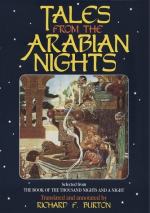U — — | U
— — | U — — | U —
La-yaksha kitali shija’u ’l-zaman,
we obtain the powerful and melodious metre in which the Shahnamah sings of Rustam’s lofty deeds, of the tender love of Rudabah and the tragic downfall of Siyawush
Shall I confess that in writing the foregoing pages it has been my ambition to become a conqueror, in a modest way, myself: to conquer, I mean, the prejudice frequently entertained, and shared even by my accomplished countryman, Rueckert, that Arabic Prosody is a clumsy and repulsive doctrine. I have tried to show that it springs naturally from the character of the language, and, intimately connected, as it is, with the grammatical system of the Arabs, it appears to me quite worthy of the acumen of a people, to whom, amongst other things, we owe the invention of Algebra, the stepping-stone of our whole modern system of Mathematics I cannot refrain, therefore, from concluding with a little anecdote anent al-Khalil, which Ibn Khallikan tells in the following words. His son went one day into the room where his father was, and on finding him scanning a piece of poetry by the rules of Prosody he ran out and told the people that his father had lost his wits. They went in immediately and related to al-Khalil what they had heard, on which he addressed his son in these terms:
“Had you known what I was saying, you would have excused me, and had you known what you said, I should have blamed you But you did not understand me, so you blamed me, and I knew that you were ignorant, so I pardoned you.”
L’Envoi.
Here end, to my sorrow, the labours of a quarter-century, and here I must perforce say with the “poets’ Poet,”
“Behold! I see the haven nigh at hand,
To which I mean my wearie course to bend;
Vere the main shete, and bear up with the land
The which afore is fairly to be ken’d.”
Nothing of importance now indeed remains for me but briefly to estimate the character of my work and to take cordial leave of my readers, thanking them for the interest they have accorded to these volumes and for enabling me thus successfully to complete the decade.
Without pudor malus or over-diffidence I would claim to have fulfilled the promise contained in my Foreword. The anthropological notes and notelets, which not only illustrate and read between the lines of the text, but assist the student of Moslem life and of Arabo-Egyptian manners, customs and language in a multitude of matters shunned by books, form a repertory of Eastern knowledge in its esoteric phase, sexual as well as social.
To assert that such lore is unnecessary is to state, as every traveller knows, an “absurdum.” Few phenomena are more startling than the vision of a venerable infant, who has lived half his long life in the midst of the wildest anthropological vagaries and monstrosities, and yet who absolutely ignores all that India or Burmah enacts under his very eyes. This is crass ignorance, not the naive innocence of Saint Francis who, seeing a man and a maid in a dark corner, raised his hands to Heaven and thanked the Lord that there was still in the world so much of Christian Charity.




